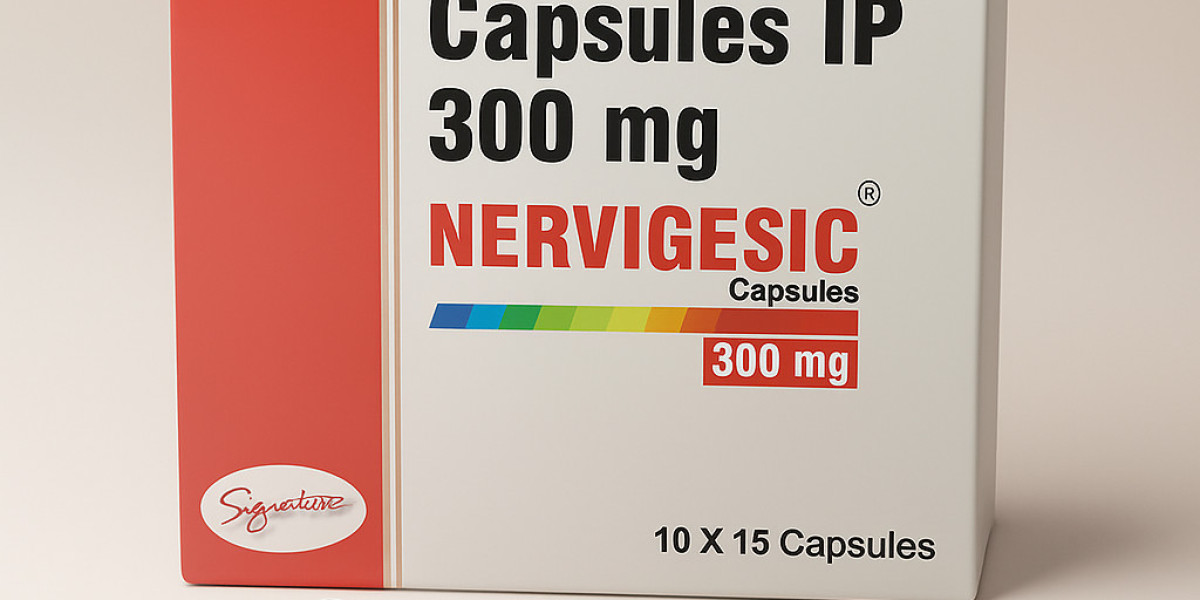Nerve pain is one of those silent disruptors of life—it creeps in gradually, making daily tasks challenging and sometimes unbearable. For many, conventional painkillers like paracetamol or ibuprofen don’t provide adequate relief. That’s where specialized medications like Nervigesic 300 mg Capsules come into the picture. Doctors often turn to this medication for its effectiveness in treating neuropathic pain. But what makes it the go-to choice, and how does it work? Let’s explore in depth.
Understanding Nerve Pain
Nerve pain, also known as neuropathic pain, arises when nerves themselves are damaged or dysfunctional. Unlike regular pain caused by injuries or inflammation, nerve pain is chronic, often described as burning, tingling, or shooting sensations. Common causes include:
Diabetes (diabetic neuropathy)
Shingles (postherpetic neuralgia)
Nerve compression (like sciatica)
Chemotherapy-induced neuropathy
Physical injuries affecting nerves
This type of pain can severely impact quality of life. Sleep disturbances, reduced mobility, anxiety, and depression are frequent companions. Because nerve pain involves the nervous system rather than just tissues, standard analgesics often fail to offer relief.
What Are Nervigesic 300 mg Capsules?
Nervigesic 300 mg Capsules contain a potent active ingredient designed specifically to target neuropathic pain. Unlike general painkillers that mask pain, Nervigesic works on the nervous system to reduce pain signals.
Key Features:
Targeted Action: Works on nerves responsible for transmitting pain signals.
Convenient Dosage: 300 mg capsules that are easy to take.
Long-Lasting Relief: Designed to maintain pain control throughout the day.
Doctor-Recommended: Often prescribed after evaluating the severity and type of nerve pain.
How Nervigesic 300 mg Works
The mechanism of Nervigesic 300 mg Capsules is sophisticated yet highly effective. Here’s a simplified breakdown:
Calms Overactive Nerves: In neuropathic conditions, nerves send exaggerated pain signals. Nervigesic helps stabilize nerve activity.
Reduces Pain Transmission: It inhibits certain pathways in the nervous system responsible for sending pain messages to the brain.
Improves Quality of Life: By reducing persistent pain, it allows patients to regain mobility and engage in daily activities without constant discomfort.
Unlike opioids or strong anti-inflammatory drugs, Nervigesic does not just mask the pain temporarily—it addresses the underlying nerve hyperactivity.
Conditions Where Doctors Commonly Prescribe Nervigesic 300 mg
Doctors often recommend Nervigesic for several neuropathic pain conditions, including:
1. Diabetic Neuropathy
High blood sugar levels can damage peripheral nerves, leading to burning sensations, numbness, and tingling in the hands and feet. Nervigesic helps manage this pain effectively, improving sleep and daily functioning.
2. Postherpetic Neuralgia
After a shingles outbreak, some patients continue to experience lingering nerve pain. Nervigesic can reduce this persistent pain by calming overactive nerve pathways.
3. Sciatica and Nerve Compression
Compression of nerves in the lower back or neck can lead to shooting or stabbing pain along the nerve pathway. Nervigesic alleviates these symptoms, often in combination with physical therapy.
4. Chemotherapy-Induced Neuropathy
Certain chemotherapy drugs can damage nerves, causing pain and sensitivity. Nervigesic is often used under careful medical supervision to ease these symptoms without interfering with cancer treatment.
5. Other Chronic Neuropathic Pain Conditions
From post-traumatic nerve injury to autoimmune disorders affecting nerves, Nervigesic is versatile enough to be considered when standard painkillers fail.
Benefits of Using Nervigesic 300 mg Capsules
Doctors prefer Nervigesic for its multiple advantages:
Effective Pain Control: Targets neuropathic pain specifically, unlike general analgesics.
Minimal Side Effects Compared to Opioids: Reduces risk of dependency.
Improved Daily Functioning: Helps patients resume work, exercise, and hobbies.
Compatible With Other Therapies: Often combined with physical therapy, lifestyle adjustments, or other medications for a holistic approach.
Recommended Dosage and Usage
Nervigesic 300 mg Capsules are usually prescribed based on the patient’s condition and tolerance.
Typical Dosage: One capsule, 1-2 times daily, as directed by a doctor.
How to Take: Swallow with water, preferably after meals to reduce stomach discomfort.
Important Tips:
Never self-medicate—always follow the prescription.
Do not abruptly stop taking it without consulting your doctor.
Inform your doctor about other medications to avoid interactions.
Possible Side Effects
Like all medications, Nervigesic 300 mg may cause side effects, though not everyone experiences them. Common mild side effects include:
Drowsiness or dizziness
Nausea
Mild headache
Fatigue
Serious side effects are rare but may include allergic reactions. It’s important to report any unusual symptoms to your doctor immediately. The benefits generally outweigh the risks when taken as prescribed.
Lifestyle Changes to Enhance Effectiveness
While Nervigesic helps manage nerve pain, doctors often recommend complementary lifestyle modifications to maximize results:
1. Maintain Blood Sugar Levels
For diabetic patients, controlling blood sugar is crucial. Proper diet, regular monitoring, and adherence to diabetes medication can prevent further nerve damage.
2. Engage in Regular Exercise
Gentle exercises like walking, yoga, or swimming improve circulation, strengthen muscles, and reduce nerve pain intensity.
3. Adopt a Balanced Diet
Foods rich in vitamins B12, B6, and antioxidants support nerve health. Avoid excessive sugar and processed foods, which can exacerbate inflammation.
4. Manage Stress
Chronic stress can worsen pain perception. Meditation, deep breathing exercises, and mindfulness practices can significantly reduce pain intensity.
5. Prioritize Sleep
Adequate sleep helps the body repair itself, including nerves affected by chronic pain.
When to Consult a Doctor
While Nervigesic is effective, it’s important to recognize when professional advice is necessary:
Pain persists despite medication
Severe side effects occur
New symptoms like numbness, weakness, or swelling appear
Pain significantly interferes with daily life
Doctors may adjust dosage, suggest combination therapy, or explore alternative treatments based on individual needs.
Precautions and Drug Interactions
Before starting Nervigesic 300 mg Capsules, discuss the following with your doctor:
Allergies: Ensure no history of allergy to the active ingredient.
Kidney or Liver Conditions: Dosage adjustments may be necessary.
Other Medications: Certain antidepressants, anticonvulsants, or alcohol can interact with Nervigesic.
Following these precautions ensures safe and effective treatment.
Conclusion
Nervigesic 300 mg Capsules have earned their place in modern neuropathic pain management. By targeting the nervous system rather than just masking pain, they offer real relief for conditions like diabetic neuropathy, sciatica, postherpetic neuralgia, and more. Doctors prescribe it because it’s effective, reliable, and integrates well with other therapies.
However, medication is just one piece of the puzzle. Combining Nervigesic with lifestyle changes, proper diet, exercise, and stress management amplifies results and improves overall quality of life. With the right approach, nerve pain no longer needs to dictate the rhythm of your day.
FAQs About Nervigesic 300 mg Capsules
1. Can Nervigesic 300 mg Capsules be used for all types of pain?
No, they are specifically designed for neuropathic (nerve) pain, not general or muscular pain.
2. How long does it take to feel relief?
Many patients notice improvement within a few days to a couple of weeks, but full effects may take longer depending on the condition.
3. Can I take Nervigesic with other painkillers?
Always consult your doctor before combining medications to avoid interactions.
4. Is Nervigesic addictive?
No, Nervigesic is not an opioid and has a low risk of dependency when used as prescribed.
5. Should I stop other medications when taking Nervigesic?
Never stop other medications without a doctor’s approval. Nervigesic is usually added to an existing treatment plan.








